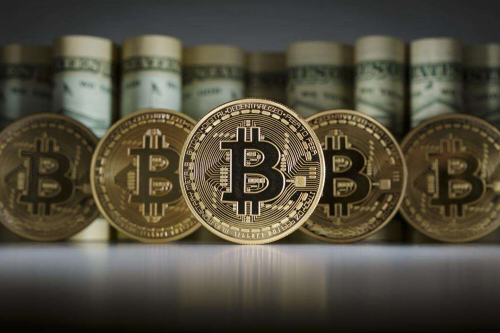Bitcoin Is Going Mainstream. Here Is What You Should Know About It
Thomas Heath
Bitcoin has been giving the Republican tax plan a run for its money when it comes to who has been dominating the news over the past week.
As of Jan. 1, the cryptocurrency was trading at $960.79 per coin. Around 4 p.m. Monday, it was selling in the $11,500 range, an increase of more than 10 times in less than a year.
The cryptocurrency joined the financial world’s mainstream last week when Chicago-based CME Group and the Chicago Board Options Exchange received approval from the Commodity Futures Trading Commission to begin trading bitcoin.
Investor bible Barron’s last week announced bitcoin’s “arrival” with the cover story “Bitcoin Storms Wall Street.”
The Nasdaq Stock Market will start a bitcoin futures site on its commodities trading platform in 2018.
Financial firms including Cantor Fitzgerald and Goldman Sachs are discussing the trading possibilities around bitcoin, which has a market value larger in size than petroleum giant BP. JPMorgan Chase chairman Jamie Dimon, investors including Warren Buffett and Bill Miller, and even the panel at CNBC’s “Squawk Box” has weighed in.
Bitcoin is still a mystery to many of us, probably because we can’t eat, see or touch it. Here’s a guide to some of bitcoin’s ins and outs.
What is bitcoin?
It is an electronic form of currency that has no physical presence anywhere in the world. There are no physical “coins” like dimes, nickels and quarters. Bitcoin, like other cryptocurrencies, exists on the Internet.
“It’s all based on a technology called block-chain that has a lot of people excited,” said Daniel P. Wiener, chief executive of Adviser Investments, a Newton, Mass.-based firm that manages more than $5 billion in assets.
Is bitcoin unique?
Nope. There were 1,324 cryptocurrencies listed on CoinMarketCap.com as of Monday. They had a total market capitalization of more than $341 billion, which is almost the size of Johnson & Johnson. But bitcoin is the biggest by far and was the first cryptocurrency.
Why has the price gone crazy?
Simple. Supply and demand. People are buying up bitcoin, driving up the price of the 16.7 million coins in circulation to a total value of $189 billion as of midday Monday.
The floor value of bitcoin is zero. It does not pay interest. There is no asset value attached to it except what the market gives it. It has no central bank supporting it.
What it does have is value, just as gold has had for thousands of years.
“Bitcoin has value because a community believes it has value,” said Christian Catalini, who studies bitcoin and other cryptocurrencies at MIT. “This is not unlike other forms of currency through history. With bitcoin, you are replacing trust in the solvency of a government and its institutions with trust in the codebase, cryptography and incentives used to run the decentralized network,” Catalini said.
Jay Blaskey, a digital currency specialist at BitIRA, a retirement option for cryptocurrencies, said the biggest driver has been the large institutional acceptance.
“When we saw rumors that Nasdaq will join the bitcoin excitement with a decision to allow futures trading on their exchange next year, it is a sign of greater general acceptance in the financial world,” Blaskey said.

Should I buy some?
Many urge caution, despite its impressive price increase in 2017. Bitcoin is a highly speculative, experimental new type of digital asset. Therefore, there is substantial uncertainty around its future evolution and potential.
“Individuals should not invest any capital that they cannot afford to lose tomorrow,” Catalini said.
“It’s not for the timid,” Blaskey said. “But neither is anything. Great rewards sometimes involve risk.”
Can you do things with it other than speculate?
Bitcoin can be used to buy merchandise anonymously, without a middleman and involving lower or no fees and no banks. It has a use as a currency for those very few businesses that accept it. Websites such as CoinDesk and 99Bitcoins list the names of businesses that accept bitcoin as payment.
It’s not easy because the currency fluctuates wildly.
There’s also a dark side to bitcoin, according toCornellLawSchoolprofessor Robert Hockett, a former adviser to the Federal Reserve Bank ofNew Yorkand the International Monetary Fund.
“People who want their transactions to be difficult to trace – drug dealers, money launderers, hipster anarchists, smugglers and terrorists – like the secrecy that cryptocurrencies facilitate,” Hockett said. “People should be cautious. The FBI, Homeland Security and other law-enforcement agencies will not continue to watch crime-enabling payments technologies with indifference.”
Just on Monday, the U.S. Securities and Exchange Commission announced its cyber unit recently filed charges against two organizers of a $15 million initial coin offering, according to CoinDesk.
Who created it?
Bitcoin was created by an unknown person in 2009 under the alias of “Satoshi Nakamoto.” The person’s real identity is not known. There are conspiracy theories about who created it.
Where can you trade bitcoin?
On bitcoin exchanges. There are lots of them. BTCChina. Bitstamp. Bitfinex. People can buy and sell using various currencies. Bitcoins are stored in digital wallets that exist in the cloud or on people’s computers.
What is next for bitcoin?
It’s still early.
“Whilst some customer-friendly websites are making it easier, there are still a whole load of people all over the planet who are interested in this asset and cannot find a way to get on board,” Blaskey said. “As this asset becomes an option in traditional portfolios, that will increase the potential demand, and this is a fixed-supply asset.”








